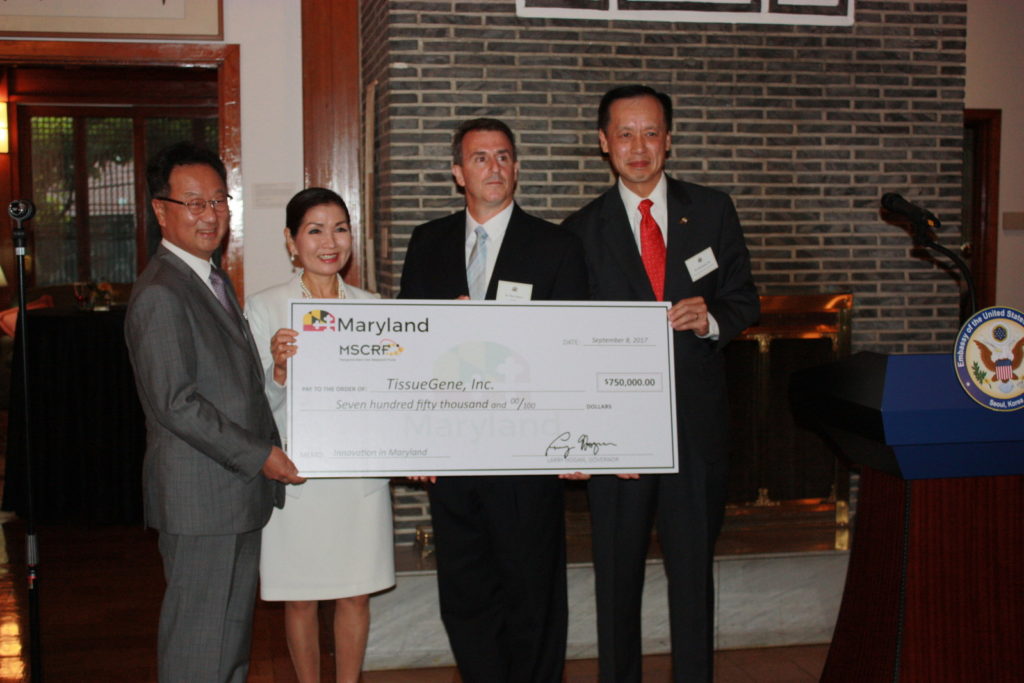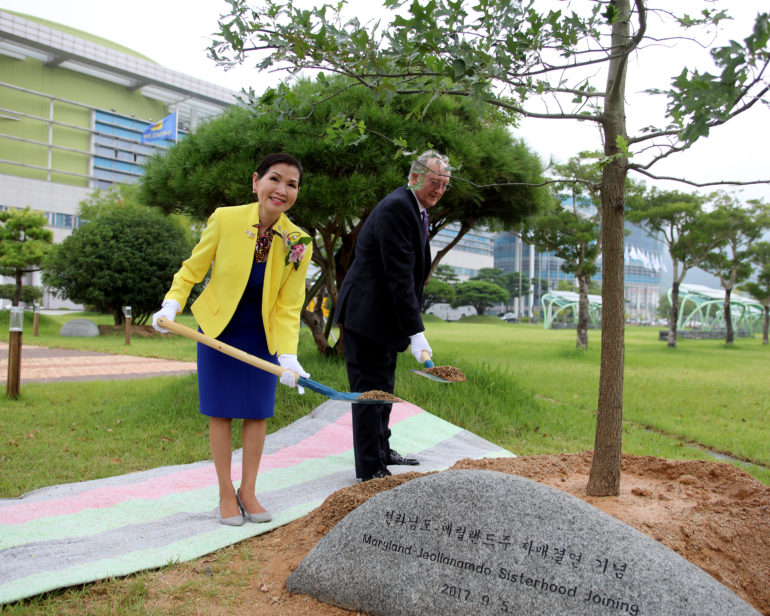By CJ Mitchell
Capital News Service
ANNAPOLIS, Maryland — A trade mission to South Korea by a Maryland government delegation, including the first lady, Yumi Hogan, brought two additional Korean-headquartered companies to the state earlier this month.
Maryland is currently home to 10 Korean-headquartered companies, according to the Maryland Department of Commerce’s Office of International Investment and Trade in an August 2017 memo to the U.S. Embassy in Seoul, with Maryland, Prince George’s County, and Montgomery County delegations traveling to the country to court more.
The Baltimore-Washington, D.C.-Northern Virginia region has the country’s third-largest Korean-American population, according to the 2010 U.S. Census, including Hogan, who is the first Korean-born first lady in the U.S.
Fasoo.com Inc., one of the companies brought to Maryland from her trade mission, provides data and application security.
While headquartered in Seoul, South Korea, its North American arm was based in Sunnyvale, California, from 2012 until 2014, when the company moved to East Brunswick, New Jersey. The company moved to Bethesda, Maryland, in late September, bringing seven employees.
“The quality of the Maryland workforce is why we’re moving from New Jersey. The high concentration of skilled and experienced information security professionals in the corridor between Washington, D.C., and Fort Meade is one of the biggest factors in the decision to shift our North American operations,” said Cho Kyu-gon, Fasoo’s founder, chairman and CEO in a press release.
The second company in the announcement, Green Cross Cell, signed a memorandum of understanding with the Maryland Department of Commerce to establish its first U.S. subsidiary, in Maryland. The 78-employee company specializes in cancer immunotherapy, and this memorandum would establish the company’s only operation outside of Asia.
The Department of Commerce did not specify a date or location for Green Cross Cell to open its subsidiary.
Memorandums of understanding, however, are not legally binding.
In May 2015, Gov. Larry Hogan led a 12-day economic development and trade mission to Korea, China and Japan that resulted in part in the signing of a memorandum of understanding between Maryland and Korea’s state-run electric utility, Korea Electric Power Corp. In November 2016, two Korean energy firms and Montgomery College signed a letter of intent to build a smart grid on the college’s Germantown campus, with a goal of reducing the cost of electricity there by 10 percent.
However, nearly a year after the November signing, no progress had been made on the campus, and the project had been scrapped.
“Unfortunately, based on in-depth and comprehensive analysis and many discussions and meetings with representatives from the Department of Commerce and Gov. Larry Hogan’s Office — it was determined that Montgomery College’s Germantown Campus was not a viable site for the smart grid demonstration project,” said Marcus Rosano, Montgomery College’s director of media and public relations.
First lady Hogan and Maryland Deputy Secretary of Commerce Ben Wu also presented a $750,000 check to TissueGene Inc., a Rockville, Maryland-based company with roots in South Korea that specializes in gene therapy to treat osteoarthritis of the knee. The grant was issued from Maryland’s Stem Cell Research Fund to aid the company in conducting clinical trials.

Kolon Life Sciences Inc., a Korea-headquartered company with intellectual property rights from TissueGene, and owned by the CEO of TissueGene, Lee Woo-sok, recently received South Korean approval for marketing TissueGene’s premiere knee injection, Invossa, within that country.
Fasoo and Green Cross Cell join 10 existing Korean-headquartered companies in Maryland. Six of these are involved in the life sciences industry, while the rest are spread across gaming, apparel, electronics and cyber-security, according to the Maryland Department of Commerce.
Seven of the 10 companies are located in Montgomery County, with two in Baltimore County and one in Prince George’s County. Montgomery County is the home of several startup incubators, including the BioHealth Innovation lab in Rockville, where two of the companies are located.
Four days after the Maryland government delegation returned from Korea, Prince George’s County Executive Rushern L. Baker III, who announced in June he is running for governor, led a three-day economic development trade mission to South Korea, where he signed a “Friendship Agreement” with Cheonan City, a technology hub located south of Seoul.
Montgomery County Executive Ike Leggett is planning to lead a nine-day trip to South Korea and China in October.
Prince George’s County is home to Maryland’s only countywide free trade zone, where foreign companies can operate inside of the U.S. with reduced import tariffs.
This zone may become more of a factor as President Donald Trump has caused rumblings about a potential withdrawal from the current free trade agreement between the United States of America and the Republic of Korea.
The agreement, which aims to reduce each nation’s tariffs by 95 percent in five years, has come under fire from Trump in recent months after newly elected South Korean President Moon Jae-in was not accepting of initial U.S. trade demands.
This comes as South Korea’s northern neighbor has ratcheted up its missile and nuclear testing, and claimed the U.S. declared war on North Korea. This has created some of the region’s highest military tensions in years, and caused Trump to sign an executive order Sept. 21 granting additional authority to the Treasury Department to enforce economic sanctions on North Korea.
In addition to attracting two new companies to Maryland, the weeklong trip, which cost $85,000, according to the Maryland Department of Commerce, saw the establishment of a sister-state relationship between Maryland and Jeollanam-do, a province in the southwest of South Korea where first lady Hogan was born.
Maryland is home to 48,592 Korean-Americans, the sixth-most in the nation by state, according to 2010 U.S. Census and 2013 American Community Survey data. Most are concentrated in Howard County, especially along Maryland Route 40 in Ellicott City, which was designated “Korean Way” by the Maryland Department of Transportation in December.


You must be logged in to post a comment.